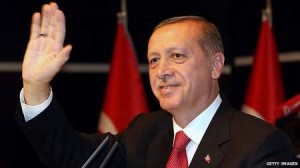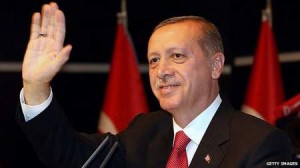Khaleej Times
Marc Grossman
In December 2014, Russian President Vladimir Putin paid a state visit to Turkey. Sitting beside Turkish President Recep Tayyip Erdo?an, he declared Turkey a “strategic partner” and announced that the two countries were moving forward with a natural gas pipeline across the Black Sea.
The visit capped four years of rapprochement. Russia and Turkey had established a High Level Cooperation Council, reached agreements on visa-free travel for their citizens, and expanded trade and investment in the energy sector. By 2014, Turkey had become one of Russia’s top ten trading partners, and Russia was Turkey’s principal source of natural gas. It appeared that Turkey – a Nato ally, but an EU outsider – was increasingly placing its strategic bet on the East.
What a difference a year makes.
Today, Turkey and Russia are in a virtual Cold War, following Turkey’s November 24 shoot-down of a Russian SU-24 fighter that violated Turkish airspace after numerous warnings. At a year-end press conference on December 17, Putin, in one of his more printable jabs at Ankara, said it was “practically impossible” for him to see “eye to eye” with Turkey’s leaders. Putin had previously called the shoot-down a “war crime,” accused Turkey of selling illicit Daesh oil, suspended visa-free travel and imposed economic sanctions on Ankara worth billions of dollars. Turkey has accused Russia of “ethnic cleansing” in Syria. On January 30, Ankara said another Russian jet had violated Turkish airspace. And to further complicate relations, a representative office for Syrian Kurds opened doors in Moscow on February 10.
With Turks considering both their country’s fragile economic and energy connections to Moscow and Russia’s interventions in close-by Crimea and Syria, President Barack Obama and America’s European allies have an opportunity to think strategically about Turkey and then act accordingly. US Vice-President Joseph Biden’s meetings in Istanbul with Erdo?an and Turkish Prime Minister Ahmet Davuto?lu in January highlight the need to engage on today’s crises, but also of the requirement to be clear that the United States has objectives that Ankara must recognise in a return to a more-than-transactional partnership.
Focus should be on these critical areas: First, using tools like America’s European Reassurance Initiative, the West needs to bolster Turkey’s defences, especially air defence. Last October, soon after Russia’s intervention in Syria and the first Russian incursions into Turkish airspace, the United States and Germany began withdrawing Patriot air defence systems from Turkey. While the withdrawal had been announced weeks earlier, it could not have come at a worse time. Nato foreign ministers were right to announce at their December meeting that the alliance will deploy more Nato ships in the eastern Mediterranean and more Nato planes based at the Turkish airbase at Incirlik.
Nato must show the Kremlin that there is a difference between the consequences of annexing Crimea and destabilising Eastern Ukraine and threatening Turkey. If Nato fails to stand by Turkey, Russian leaders may conclude that Article V of the Nato Treaty has no meaning and that the alliance might not be prepared to defend the Baltic States should Putin meddle there.
Second, Nato should increase those forms of cooperation that focus Turkey on the fight against Daesh, including the creation of a safe zone in Syria where some refugees can find security. If the US and Nato are prepared to put in the effort, Ankara must seriously commit to the anti-Daesh team, understanding that while Assad must go, defeating Daesh comes first.
Third, the West needs to get back in the strategic energy game. Russia, which provides Turkey with 55 per cent of its annual natural gas consumption, has, by imposing sanctions, reminded the West that decreasing dependence on Russia is not just good economics, it is part of an answer to Russian pressure on Europe, Ukraine and now Turkey. Reviving the longstanding US objective to create an East-West energy corridor with multiple pipelines to bring oil and natural gas from Central Asia to world markets through Turkey, should be high on US and EU agendas with Ankara.
As German Chancellor Angela Merkel’s emergency visit to Turkey on February 8 highlights, Europe urgently needs Turkish help on refugees. And the United States needs Ankara’s help against Daesh and in the effort to negotiate an end to the Syrian nightmare. Erdo?an has leverage. Some of it is earned: Turkey is sheltering an estimated two million Syrian refugees. But perhaps it is clearer today in Ankara that Turkey needs US and European support to reduce its energy dependence on Russia, to defend against Moscow’s military provocations, and to end the terrorist and refugee threats that loom larger each day the war in Syria continues.
As Brussels returns, as part of a refugee compensation package, to negotiations about Turkey’s future EU accession, which the US should continue to support, they must also talk privately to Erdo?an and publicly to Turkish citizens about Turkey’s future as a tolerant, pluralistic ally which values the rule of law, just as Biden did in Istanbul. After Russia first intervened in Syria, President Obama warned, “The Russians have made a serious mistake.” He was referring to the prospect that Moscow may find itself in a military quagmire in Syria, but he may be right for another reason. Russia’s military provocations may force Turkey to reconsider its relationship with, and dependence on, Moscow. This creates an opportunity for the West if it has the wisdom to think strategically about Turkey today and is prepared to speak out for the kind of country it hopes it could be tomorrow. Marc Grossman is a vice chairman of The Cohen Group in Washington. He was the US Special Representative for Afghanistan and Pakistan 2011-2012. A career Foreign Service Officer, 1976-2005, his previous assignments included Under Secretary for Political Affairs and ambassador to Turkey




